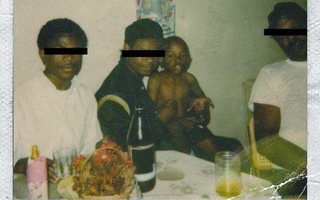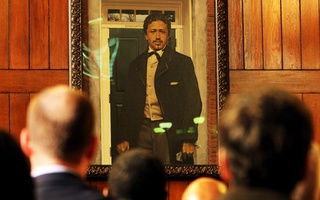{shortcode-c63b9ef9067b5e3e6a4e60176b6b826a2159629b}“Black-ish” is at its best when it is loud, black, and proud. The Season Four musical-style premiere (“Juneteenth”) is just that. It is a deliberate decision to make “Juneteenth” a musical episode—approaching a complicated issue like slavery on a half-hour primetime sitcom requires palatable packaging. With that said, the issue is treated with the gravity it requires.
The series is no stranger to tackling contentious matters. The pilot addressed Andre “Dre” Johnson Sr.’s (Anthony Anderson) fear that his success had come with the price of his children lacking knowledge about their own black culture. The show’s second season confronted police brutality and the Black Lives Matter movement. Issues of race are threaded carefully and delicately throughout the show’s history. Season Four, so far, proves no different.
“Juneteenth” opens with Jack and Diane, Dre’s youngest children, putting on a school play about Columbus. Dre objects to the production, pointing out the racial legacy of Columbus that, in his words, is too often glossed over by many Americans. This is done in typical Dre fashion: His outrage embarrasses the family right out of the auditorium. “Black-ish” is able to use the angry black man trope comedically, because in this case, Dre’s frustration is framed as a rational response to the memorialization of an acutely racist figure. The audience is not laughing at him but at the uncomfortableness of the situation. Spurred by this incident, Dre returns to his job as an advertising executive determined to make Juneteenth—the seldom celebrated June 19th holiday that honors the emancipation of slaves across the former Confederacy—a widely-celebrated holiday.
Dre’s history lessons concerning the holiday take on the form of musical numbers. They do not come off as tonally awkward juxtaposed to the grim content. The episode avoids being showtunes-like, subverting the preconceived notion that musical television episodes tend to be lighthearted and boisterous endeavors. The music is somber, styled after African slave spirituals and largely set on a fantasy Johnson home in the antebellum South. However, the standout musical number from the episode is the uncomfortably cheerful yet comedic transformation of the Schoolhouse Rock’s “I’m Just a Bill” song into a song about slavery.
Dre’s indignation is not enough for him to garner the support of his colleagues. His frustration, as he expresses his disappointment to Bow, his wife, is a particularly poignant moment in the episode. The episode allows Dre to communicate his stance in a clear and unflinching manner. The other side of the issue is presented as nothing more than a willful submission to the status quo. His family and colleagues counter that people’s uneasiness over slavery will always prevent the celebration of Juneteenth, but the off-handed way in which they deliver their points fail to match the gravity of Dre’s argument.
It is a moment that perfectly encapsulates the contradictions of being black and being an American. When Dre expresses his discontent, others around him can only articulate the futility of his goals. They understand that America’s inability to confront slavery is a problem, but they also acknowledge that the avoidance of slavery is a fixture of American society. The only way for black people to proceed is by taking ownership of their own history—and not waiting for the rest of the country to do so. Ultimately, this leads the Johnsons to decide that even if the rest of America will not celebrate Juneteenth, their family surely will.
It is a powerful and much needed episode. After the tragedy of Charlottesville, the clash over Confederate statues, and the controversy surrounding players kneeling in the NFL, racial tensions are high in the United States. “Black-ish” does not use growing racial tensions as an excuse to back away from its past convictions.
Read more in Arts
Top Five: Historical DramasRecommended Articles
-
 The Latest Compton Star Begins Ascent to the Throne
The Latest Compton Star Begins Ascent to the Throne -
Letter to the Editor: What's in a Name?To be black and Crimson is to be presented with an unending stream of demands on our capacity for resilience, such that the threat is not that we lose the capacity from lack of use, but rather, that resilience, along with patience, becomes a depleted resource.
-
With ‘Lyk Dis,’ NxWorries Makes Good on Its PotentialThat single, “Lyk Dis,” is a step in the right direction. .Paak continues to behave as though there’s nothing new under the sun, rap-singing about morning sex and milking the subject for all its worth. Yet he brings a sense of melody that only appeared in glimmers on “Suede.”
-
 ‘Ghost Portraits’ Commemorate Underrepresented Minorities at School of Public Health
‘Ghost Portraits’ Commemorate Underrepresented Minorities at School of Public Health -
 Freshman-Curated Exhibition Explores Relationship Between Slavery and Christianity
Freshman-Curated Exhibition Explores Relationship Between Slavery and Christianity













